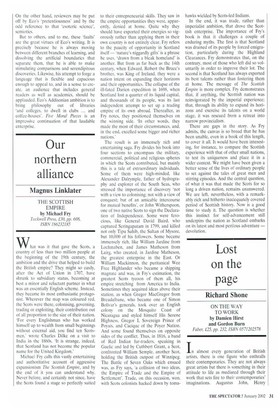Our northern alliance
Magnus Linklater
THE SCOTTISH EMPIRE by Michael Fry Tackwell Press, £30, pp. 608, ISBN 186232185 What was it that gave the Scots, a country of less than two million people at the beginning of the 19th century, the ambition and the drive that helped to build the British empire? They might so easily, after the Act of Union in 1707, have shrunk to subsidiary status, becoming at best a minor and reluctant partner in what was an essentially English scheme. Instead, they became its most enthusiastic protagonist. Wherever the map was coloured red. the Scots were there, colonising, governing, trading or exploiting, their contribution out of all proportion to the size of their nation. 'For every Englishman who has worked himself up to wealth from small beginnings without external aid, you find ten Scotsmen. wrote Charles DiIke on a visit to India in the 1860s. 'It is strange, indeed, that Scotland has not become the popular name for the United Kingdom,'
Michael Fry calls this vastly entertaining and authoritative account of aggressive expansionism The Scottish Empire, and by the end of it you can understand why. Never before, and certainly not since, have the Scots found a stage so perfectly suited
to their entrepreneurial skills. They saw in the empire opportunities they were, apparently, denied at home. Quite why they should have exported their energies so vigorously rather than applying them in their own country is not entirely clear. Fry refers to the paucity of opportunity in Scotland itself — 'nature's niggardly gifts' is a phrase he uses. 'drawn from a bleak homeland' is another. But from as far back as the 14th century, when Edward, Robert the Bruce's brother, was King of Ireland, they were a nation intent on expanding their horizons and their opportunities. The collapse of the ill-fated Darien expedition in 1698, when Scotland lost a quarter of its liquid capital, and thousands of its people, was its last independent attempt to set up a trading empire of its own abroad. Thereafter, as Fry notes, they positioned themselves on the winning side, 'In other words, they made the most of their circumstances, and, in the end, excelled some bigger and richer nations.'
The result is an immensely rich and entertaining saga. Fry divides his book into four sections to encompass the military, commercial, political and religious spheres in which the Scots contributed, but mainly this is a tale of extraordinary individuals. Some of them were high-minded, like Alexander Dalrymple, father of hydrography and explorer of the South Seas, who stressed the importance of discovery 'not with a view to colonising; not with a view of conquest; but of an amicable intercourse for mutual benefits', or John Witherspoon, one of two native Scots to sign the Declaration of Independence. Some were ferocious, like General David Baird, who captured Seringapatam in 1799, and killed not only Tipu Sahib, the Sultan of Mysore, but 10,000 of his followers. Some became immensely rich, like William Jardine from Lochmaben, and James Matheson from Lairg, who created. in Jardine Matheson, the greatest enterprise in the East, Or William Mackinnon, the puritanical Wee Free Highlander who became a shipping magnate and was, in Fry's estimation, the greatest Scots tycoon of them all, his empire stretching from America to India. Sometimes they acquired ideas above their station, as when Gregor MacGregor from Breadalbane, who became one of Simon Bolivar's generals, took over an English colony on the Mosquito Coast of Nicaragua and styled himself His Serene Highness, Gregor I, Sovereign Prince of Poyais, and Cacique of the Payer Nation. And some found themselves on opposite sides of the conflict. Thus, in 1816, a band of Red Indian fur-traders, speaking in Gaelic and led by Cuthbert Grant, a Scot, confronted William Semple, another Scot, holding the British outpost of Winnipeg. The Battle of Seven Oaks which ensued was, as Fry says, 'a collision of two ideas, the Empire of Trade and the Empire of Settlement'. Trade, on this occasion, won, with Scots colonists hacked down by toma
hawks wielded by Scots-led Indians.
In the end, it was trade, rather than imperialist ambition, that drove the Scottish enterprise. The importance of Fry's book is that it challenges a couple of enduring myths. The first is that Scotland was drained of its people by forced emigration, particularly during the Highland Clearances, Fry demonstrates that, on the contrary, most of those who left did so voluntarily in order to improve their lot. The second is that Scotland has always exported its best talents rather than fostering them at home. The message of The Scottish Empire is more complex. Fry demonstrates that, if anything, the Scottish nation was reinvigorated by the imperial experience; that, through its ability to expand its horizons and exercise its talents on a world stage, it was rescued from a retreat into narrow provincialism.
There are gaps in the story. As Fry admits, the canvas is so broad that he has been unable, even in a book of this length, to cover it all. It would have been interesting, for instance, to compare the Scottish experience with that of other small nations, to test its uniqueness and place it in a wider context. We might have been given a better sense of the lives of ordinary people to set against the tales of great men and stirring episodes. And the central question, of what it was that made the Scots for so long a driven nation, remains unanswered. We are left, nevertheless, with a remarkably rich and hitherto inadequately covered period of Scottish history. Now is a good time to study it. The question is whether this instinct for self-advancement still underpins the nation as Scotland embarks on its latest and most perilous adventure — devolution.






















































 Previous page
Previous page